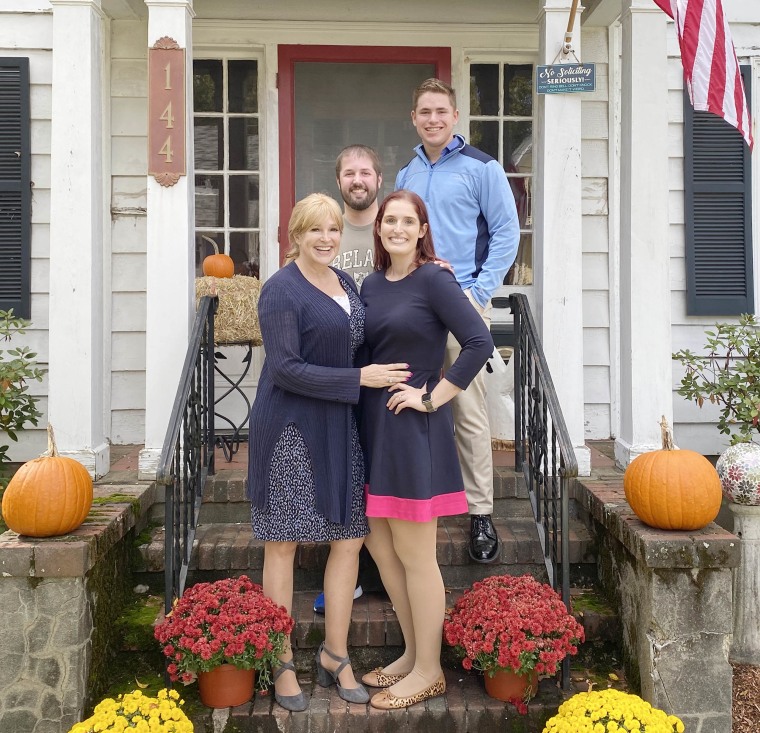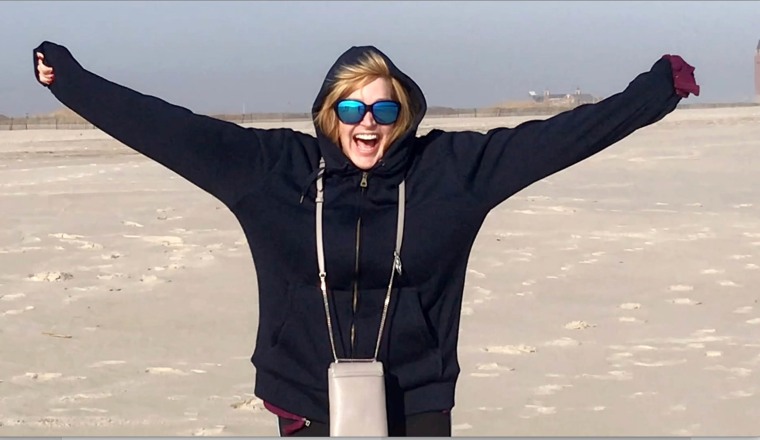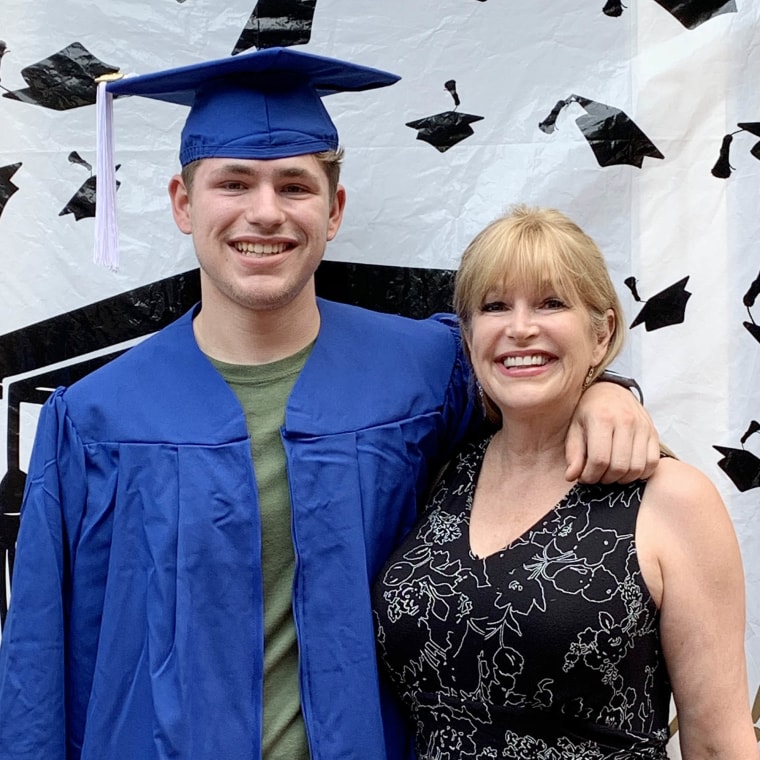Katherine Fitzgerald, then 57, had just arrived at a graduation party when she began feel uncomfortably hot and nauseated. Her chest tightened in pain, and she began “violently vomiting,” she recalls. Someone called 911, and when the paramedics arrived, she felt stunned by their response: They told her she was having a panic attack.
“I explained my symptoms. I said, ‘No, I’m not having a panic attack. I think I’m dying,’” the 61-year-old from Greenburgh, New York, tells TODAY.com. “They said, ‘Well, that’s what people who have panic attacks say.’”
Eventually, she began feeling a little better and went home and rested. But when she still felt ill the next day, she visited the emergency room where she learned why.
“They told me that I had a heart attack,” she says.
A collection of scary symptoms
Soon after taking some photos at a graduation party on a Saturday in 2020, Fitzgerald’s symptoms began.

“I got really sweaty and hot, like unbearably hot, and I had to go inside and try to find some air conditioning,” she says. “I had a chest pain, and I couldn’t breathe, and my right elbow felt like it was broken. I started vomiting.”Fitzgerald thought she was dying, and someone called 911. But the paramedics told her she was simply having a panic attack. She felt “incapacitated,” she recalls, so she watched as the paramedics discouraged her from going to the emergency room because of the COVID-19 pandemic.
“My son was like, ‘My mom might as well go to the hospital. It couldn’t hurt to get it checked out,’” Fitzgerald says. “The paramedics said, ‘No it could hurt. It’s COVID. You don’t want to go to the hospital if you don’t have to go.’”
Again, they said Fitzgerald was having a panic attack.
“They left, and they said if I get worse, (to) call them and they’ll come back and take me to the hospital,’” she says. “I stopped throwing up. I still had the chest pain, (but) the heat cooled.”
Fitzgerald returned home and remained in bed until Monday.
“I was still feeling terribly,” she says. “So I went to the ER.”
There, she learned that she'd had a heart attack. The next day they placed two stents in her arteries to open them.
After returning home, she started experiencing pain in her lower right abdomen. “I called my cardiologist and I said, ‘I’m having a stroke,’ and I started vomiting again,” she recalls.
Her doctor told her to go back to the hospital, where she underwent a scan.
“It turns out there were blood clots in my kidney from my heart attack or from the stent placement,” she says. “I wound up spending another five days in the hospital on a (anticoagulant) heparin drip.”
Fitzgerald took a leave of absence from her work as an assistant district attorney. She tried returning to work but had another heart episode and ended up needing more procedures to keep her blood vessels open and prevent further heart attacks. She was on disability leave for a year.
“I still have two arteries that are clogged, but we can’t repair them,” Fitzgerald says.

In total, Fitzgerald experienced three heart attacks, the first in 2020 and two in the beginning of 2021. She remains unsure if the delay in treatment she experienced during her first heart attack led to the complications she experienced. Still, being dismissed maddens her.
“I’m so angry about that. I’m so emotional because I just felt like no one had my back. I felt like my 18-year-old was the only one who had my back and spoke up, and the paramedics shut him down,” she says. “If I had been a man complaining of chest pains and had those symptoms, there’s no doubt in my mind that I would have been in the hospital.”
Women and heart attacks
Heart attacks in women are becoming more common, TODAY.com previously reported.
“Women and men generally have the same symptoms with heart attacks, (but) women have more symptoms and we may describe our symptoms differently," Dr. Harmony Reynolds, cardiologist at NYU Langone Heart and director of the Sarah Ross Soter Center for Women’s Cardiovascular Research at NYU Grossman School of Medicine and Fitzgerald's current cardiologist, tells TODAY.com.
Symptoms of heart attack, according to Reynolds, include:
- Chest pain
- Shortness of breath
- Nausea
- Sweating
- An uneasy feeling that something is wrong
- Extreme fatigue
“Chest pain doesn’t need to be painful. It may be a discomfort or a sense that something is wrong in the chest,” Reynolds says. “When we think of chest discomfort as cardiologists, we’re really thinking of any symptoms that go from the jawline or teeth to the upper stomach, including the neck, shoulders, arm or the back.”
Reynolds has researched how gender and race impact the care that people receive when they go to the emergency room with chest pain. The study, which appeared in the Journal of the American Heart Association, found that women and people of color waited longer for treatment.
“Even with chest pain, we find that there are some patients who are told that nothing much is wrong because of the demographics they are in, especially women, younger patients and people of color,” Reynolds says. “All of these people are waiting longer.”
She tells her patients to be very clear when they go to the hospital with chest pain.
“They have to come in and say, ‘I think I’m having a heart attack,’” Reynolds says. “Even if it’s clearly not a heart attack, you need to have your concerns answered.”
A delay in treatment can lead to more damage to the heart.
“The longer we wait, the less opportunity we have to salvage the muscle that’s in jeopardy,” she says. “It’s critically important to get immediate attention.”
Some people might feel afraid to say they’re having a heart attack, especially if that is not the case. Reynolds hopes they overcome that fear to advocate for themselves.
“They’re afraid that they’re going to be bothering somebody or they’ll be embarrassed if they’re wrong. That should never happen,” she says. “We know that people who come to the emergency room don’t all turn out to have the thing they thought they had and that’s fine. … It’s important to come in and get checked out.”
Improved health
Fitzgerald feels surprised she had three heart attacks. She followed a fairly healthy diet and led an active lifestyle with regular Pilates and spin classes. Every year, she visited her doctor for a checkup, including blood tests and regular blood pressure monitoring, which usually came back as normal.
“I feel like I did everything right,” she says. “But somehow it was still missed.”

After her heart attacks, Fitzgerald participated in cardiac rehabilitation and modified her diet. She also took a lower stress job to help her cope with her changing health.
“I pay more attention to my stress level, which I did not pay attention to before,” she says. “I feel more calm. I’m enjoying every day, and I’m lucky to be alive.”
She hopes her story teaches people how serious chest pain is and that it needs immediate medical attention.
“Everybody needs to know ... the classic symptoms of a woman having a heart attack,” she says. “Heart disease is so prevalent among women, and women don’t get the same treatment because nobody knows. You don’t think of a woman having a heart attack.”